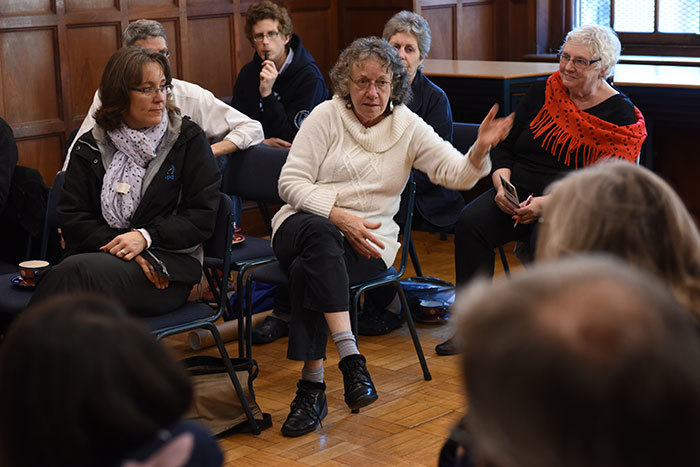Careers expo champions non-profit sector
13 August 2015 | Story by Newsroom
The Jameson Hall buzzed with stallholders and students in the annual Careers Service expo for NPOs and civil society in early August. And for the first time the UCT Knowledge Co-op and Poverty & Inequality Initiative (PII) offered supporting events.
In keeping with the development theme, the aim was to introduce students to job opportunities and scope in the non-profit sector as an employment alternative to business and industry.
From exhibitions on beekeeping (it's essential to train up the next generation of beekeepers) to electric motorcycles (sustainable transport, even in the face of load shedding) and numeracy and maths programmes, there was plenty to think about for students keen to tackle society's development needs through their working lives.
Both the Knowledge Co-op and the PII demonstrate community and development partnerships and thrust at an institutional level.
The UCT Knowledge Co-op works with community organisations to help them answer pressing questions or address physical challenges. Through the Knowledge Co-op these organisations can access UCT's intellectual capital, either through their skills, resources or professional expertise.
These joint projects address a wide range of need: from early childhood development to prisoner rehabilitation, and sustainable community gardens. In one instance, a student in the Faculty of Engineering and the Built Environment worked with a community organisation to develop material that could be used to build a theft-proof fence for their educare centre.
Deepening poverty and inequality
The PII aims to increase the university's collective contribution to tackling the conundrum of deepening poverty and inequality in a resource-rich country. They work with all major role players inside and outside the university, including academics, research groups and NGOs who are doing poverty-alleviation-related work, either at policy or at intervention levels.
With this background, the PII teamed up with the Careers Service to offer a lunchtime panel addressed by alumni working in the non-profit sector.
Alumnus Chantelle de Abreu (MA Clinical Psychology) is director of Educating Athletes, an organisation she founded after noticing a gap for "unbiased holistic support" for young athletes turning professional.
"The skills and knowledge I learn from psychology allow me to work in a counselling capacity as well as being able to interact and work with different people. But often it's not the content of the degree that's helped but what gaining a degree has taught me. The hard work, sacrifice and discipline I gained while studying help me to push through when times are challenging."
'Rights to the city'
Graduate Chidzo Muzondo (BSocSc Hons, Environmental & Geographical Science) is employed as a research and communications intern at Isandla Institute.
"My work is about how the urban disenfranchised access 'rights to the city', which speaks to more than just the individual liberty and freedoms but about the power that urban poor have to collectively transform and reimagine their urban life or city."
Alumnus Jessica Dewhurst (BSocSc Sociology and Social Development) is social justice and advocacy desk co-ordinator for the Edmund Rice Network of Southern Africa (ERNSA).
"When working with difficult social issues, having a passion and desire for change is incredibly important. Yet something that's equally important is having an academic understanding of how inequalities come about, as well as how societies operate. This is to properly challenge societal structures to create effective and sustainable change."
A special message came from alumnus Zukiswa Mqolomba (MSocSc Public Policy), now director of economic research and writing in the Department of Public Enterprises. Mqolomba has participated in civic programme attached to the United Nations, NATO, and The Elders and African Union.
"I really believe that Africa needs a new cadre of young leaders who will exploit their talents in efforts to contribute to the renewal of the continent. Africa needs talented folks and the time is now."
'Research can become a tool to change lives'
Later in the afternoon, the Knowledge Co-op held a networking and information session in the TB Davie Seminar Room where NPO exhibitors and UCT academics shared their projects and experiences.
MSc student in speech and language pathology Prianka Parusnath developed a language observational tool for use in classrooms and partnered with Wordworks Early Literacy Programme.
The programme trains and co-ordinates volunteer groups to work in schools and libraries, supporting young pupils learning to read and write. The experience was invaluable, she says.
"The Knowledge Co-op helped me realise how my research can become a tool to change lives."
For a further look at the UCT Knowledge Co-op, read Hand-in-hand: Knowledge works for communities.
Story by Helen Swingler. Photo by Michael Hammond.
 This work is licensed under a Creative Commons Attribution-NoDerivatives 4.0 International License.
This work is licensed under a Creative Commons Attribution-NoDerivatives 4.0 International License.
Please view the republishing articles page for more information.










